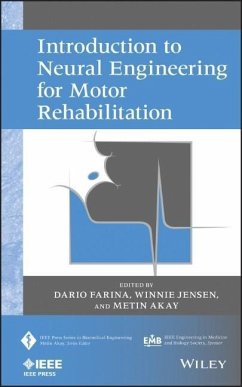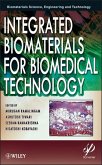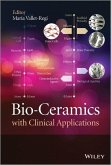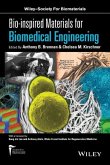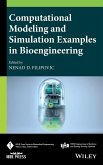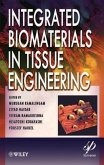Neural engineering is a discipline that uses engineering techniques to understand, repair, replace, enhance, or treat diseases of neural systems. Currently, no book other than this one covers this broad range of topics within motor rehabilitation technology. With a focus on cutting edge technology, it describes state-of-the-art methods within this field, from brain-computer interfaces to spinal and cortical plasticity. Touching on electrode design, signal processing, the neurophysiology of movement, robotics, and much more, this innovative volume collects the latest information for a wide range of readers working in biomedical engineering.
The only book that covers in detail a broad range of cutting-edge topics within motor rehabilitation technology
Neural engineering is a discipline that uses engineering techniques to understand, repair, replace, enhance, or treat diseases of neural systems. This book describes state-of-the-art methods within this field, from brain-computer interfaces to spinal and cortical plasticity. Touching on electrode design, signal processing, the neurophysiology of movement, robotics, and much more, this innovative book presents the latest information for readers working in biomedical engineering.
Each section of Introduction to Neural Engineering for Motor Rehabilitation begins with an overview of techniques before moving on to provide information on the most recent findings. Topics include:
INJURIES OF THE NERVOUS SYSTEM-including diseases and injuries of the central nervous system leading to sensory-motor impairment; peripheral and spinal plasticity after nerve injuries; and motor control modules of human movement in health and disease
SIGNAL DETECTION AND CONDITIONING-including progress in peripheral neural interfaces; multi-modal, multi-site neuronal recordings for brain research; methods for non-invasive electroencephalograph detection; wavelet denoising and conditioning of neural recordings
FUNCTION REPLACEMENT (Prostheses and Orthosis)-including an introduction to upper limb prosthetics; controlling prostheses using peripheral nerve stimulation invasive interfaces for amputees; and exoskeletal robotics for functional substitution
FUNCTION RESTORATION-including methods for movement restoration; advanced user interfaces for upper limb functional electrical stimulation; and selectivity of peripheral neural interfaces
REHABILITATION THROUGH NEUROMODULATION-including brain-computer interface applied to motor recovery after brain injury; functional electrical therapy of upper extremities; and robotic assisted neurorehabilitation
Introduction to Neural Engineering for Motor Rehabilitation is an important textbook and reference for graduate students and researchers in the fields of biomedical and neural engineering.
Hinweis: Dieser Artikel kann nur an eine deutsche Lieferadresse ausgeliefert werden.
The only book that covers in detail a broad range of cutting-edge topics within motor rehabilitation technology
Neural engineering is a discipline that uses engineering techniques to understand, repair, replace, enhance, or treat diseases of neural systems. This book describes state-of-the-art methods within this field, from brain-computer interfaces to spinal and cortical plasticity. Touching on electrode design, signal processing, the neurophysiology of movement, robotics, and much more, this innovative book presents the latest information for readers working in biomedical engineering.
Each section of Introduction to Neural Engineering for Motor Rehabilitation begins with an overview of techniques before moving on to provide information on the most recent findings. Topics include:
INJURIES OF THE NERVOUS SYSTEM-including diseases and injuries of the central nervous system leading to sensory-motor impairment; peripheral and spinal plasticity after nerve injuries; and motor control modules of human movement in health and disease
SIGNAL DETECTION AND CONDITIONING-including progress in peripheral neural interfaces; multi-modal, multi-site neuronal recordings for brain research; methods for non-invasive electroencephalograph detection; wavelet denoising and conditioning of neural recordings
FUNCTION REPLACEMENT (Prostheses and Orthosis)-including an introduction to upper limb prosthetics; controlling prostheses using peripheral nerve stimulation invasive interfaces for amputees; and exoskeletal robotics for functional substitution
FUNCTION RESTORATION-including methods for movement restoration; advanced user interfaces for upper limb functional electrical stimulation; and selectivity of peripheral neural interfaces
REHABILITATION THROUGH NEUROMODULATION-including brain-computer interface applied to motor recovery after brain injury; functional electrical therapy of upper extremities; and robotic assisted neurorehabilitation
Introduction to Neural Engineering for Motor Rehabilitation is an important textbook and reference for graduate students and researchers in the fields of biomedical and neural engineering.
Hinweis: Dieser Artikel kann nur an eine deutsche Lieferadresse ausgeliefert werden.

